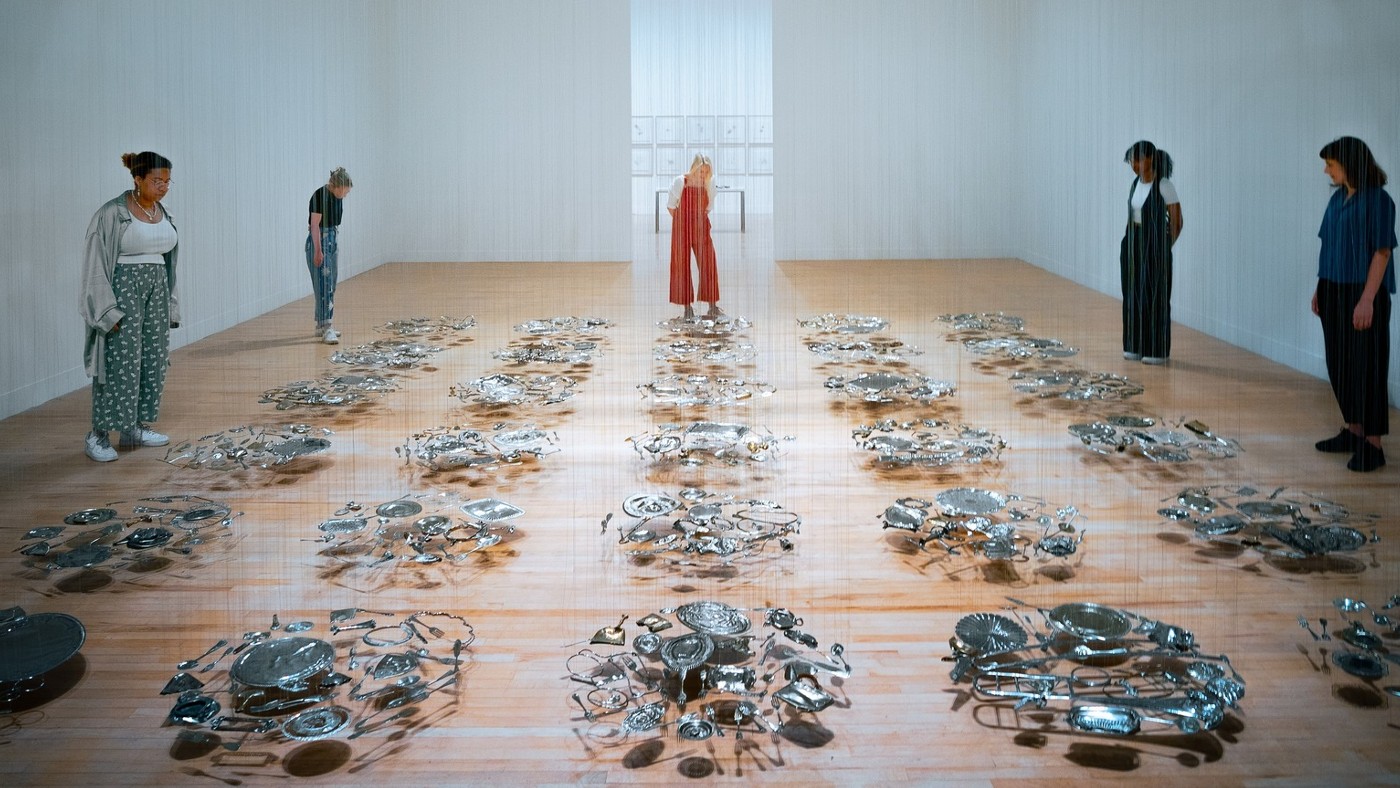Cornelia Parker at Tate Britain: a ‘mesmerising’ and long overdue retrospective
This free show traces Parker’s career from the 1980s to the present day

A free daily email with the biggest news stories of the day – and the best features from TheWeek.com
You are now subscribed
Your newsletter sign-up was successful
Cornelia Parker is “at once the most impishly playful and yet profoundly thoughtful artist working today”, said Rachel Campbell-Johnston in The Times. Now 66, Parker quite literally “exploded” onto the scene back in 1991, when she asked a team of Army engineers to blow up a garden shed, then gathered up the detritus, and used it to create an installation.
Entitled Cold Dark Matter, it consisted of the remains of the shed and its contents – ragged fragments of wood cladding, “wonky bike wheels”, a bent garden rake – suspended on “long threads of glimmering wire” from the gallery ceiling, as if caught in the post-blast violence.
“A split-second moment stilled for ever in a fragile mobile”, it proved “alluringly poetic” and captured the imagination of critics and the public. Now, it is the centrepiece of a “mesmerising” and long overdue retrospective at Tate Britain, which traces Parker’s career from the late 1980s to the present day, and which contains all her major pieces.
The Week
Escape your echo chamber. Get the facts behind the news, plus analysis from multiple perspectives.

Sign up for The Week's Free Newsletters
From our morning news briefing to a weekly Good News Newsletter, get the best of The Week delivered directly to your inbox.
From our morning news briefing to a weekly Good News Newsletter, get the best of The Week delivered directly to your inbox.
‘Creates through acts of destruction’
Parker “often creates through acts of destruction”, said Hettie Judah for the i news site. She made the first work here, Thirty Pieces of Silver (1988), by driving a steamroller over “a vast quantity” of silver artefacts (teapots, salvers, and so on) that she’d found “at flea markets and junk shops”, and arranging them on the ground in 30 circles.
Although the piece’s biblical title suggests that it is a meditation on betrayal, it is really about “the price we set on things” – a collection of “once-prized” but now unwanted objects is here deformed beyond recognition. Elsewhere, Shared Fate (Oliver) (1998) consists of a toy doll of Oliver Twist that Parker bisected with the guillotine that was used to behead Marie Antoinette; another piece involves a handgun that has “rusted down to a powder, destroying its iconic power”.
‘Genuinely exciting to look at’
These works are quite brilliant, said Waldemar Januszczak in The Sunday Times. Parker is that rare conceptual artist whose “contributions to the genre are genuinely exciting to look at”. Lately, however, she has made unwise forays into film: those on show here are “worthy and ponderous”, and really not “worth the bother”.
There are other wrong notes besides, said Alastair Sooke in The Daily Telegraph. Island, a new work, consists of a “vulnerable” greenhouse that Parker bought on eBay; its panes are “daubed with chalk” from the cliffs of Dover, its interior is paved with tiles recovered from the Houses of Parliament. It does a fine job of reflecting the “delicate” situation Britain finds itself in – but its “anti-Brexit sentiment”, reinforced by an accompanying text, “is so stark it feels didactic”. Still, when Parker is on form, she produces very fine work indeed, pieces that have the power to elicit a genuine “emotional response”; and the Tate show, though imperfect, is packed with memorable works.
A free daily email with the biggest news stories of the day – and the best features from TheWeek.com
Tate Britain, London SW1. Until 16 October
-
 6 exquisite homes with vast acreage
6 exquisite homes with vast acreageFeature Featuring an off-the-grid contemporary home in New Mexico and lakefront farmhouse in Massachusetts
-
 Film reviews: ‘Wuthering Heights,’ ‘Good Luck, Have Fun, Don’t Die,’ and ‘Sirat’
Film reviews: ‘Wuthering Heights,’ ‘Good Luck, Have Fun, Don’t Die,’ and ‘Sirat’Feature An inconvenient love torments a would-be couple, a gonzo time traveler seeks to save humanity from AI, and a father’s desperate search goes deeply sideways
-
 Political cartoons for February 16
Political cartoons for February 16Cartoons Monday’s political cartoons include President's Day, a valentine from the Epstein files, and more
-
 6 exquisite homes with vast acreage
6 exquisite homes with vast acreageFeature Featuring an off-the-grid contemporary home in New Mexico and lakefront farmhouse in Massachusetts
-
 Film reviews: ‘Wuthering Heights,’ ‘Good Luck, Have Fun, Don’t Die,’ and ‘Sirat’
Film reviews: ‘Wuthering Heights,’ ‘Good Luck, Have Fun, Don’t Die,’ and ‘Sirat’Feature An inconvenient love torments a would-be couple, a gonzo time traveler seeks to save humanity from AI, and a father’s desperate search goes deeply sideways
-
 A thrilling foodie city in northern Japan
A thrilling foodie city in northern JapanThe Week Recommends The food scene here is ‘unspoilt’ and ‘fun’
-
 Tourangelle-style pork with prunes recipe
Tourangelle-style pork with prunes recipeThe Week Recommends This traditional, rustic dish is a French classic
-
 Samurai: a ‘blockbuster’ display of Japan’s legendary warriors
Samurai: a ‘blockbuster’ display of Japan’s legendary warriorsThe Week Recommends British Museum show offers a ‘scintillating journey’ through ‘a world of gore, power and artistic beauty’
-
 BMW iX3: a ‘revolution’ for the German car brand
BMW iX3: a ‘revolution’ for the German car brandThe Week Recommends The electric SUV promises a ‘great balance between ride comfort and driving fun’
-
 Arcadia: Tom Stoppard’s ‘masterpiece’ makes a ‘triumphant’ return
Arcadia: Tom Stoppard’s ‘masterpiece’ makes a ‘triumphant’ returnThe Week Recommends Carrie Cracknell’s revival at the Old Vic ‘grips like a thriller’
-
 My Father’s Shadow: a ‘magically nimble’ love letter to Lagos
My Father’s Shadow: a ‘magically nimble’ love letter to LagosThe Week Recommends Akinola Davies Jr’s touching and ‘tender’ tale of two brothers in 1990s Nigeria